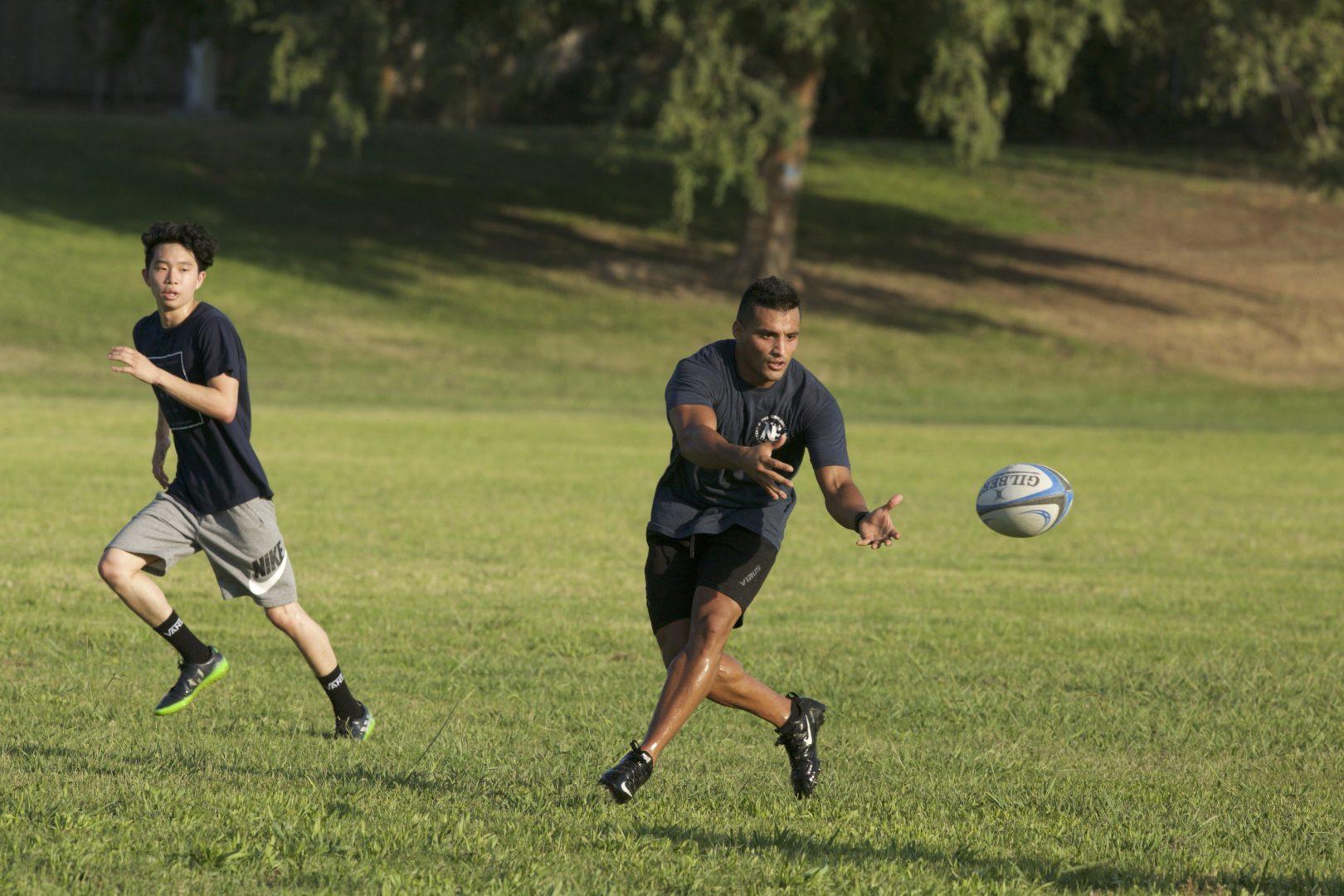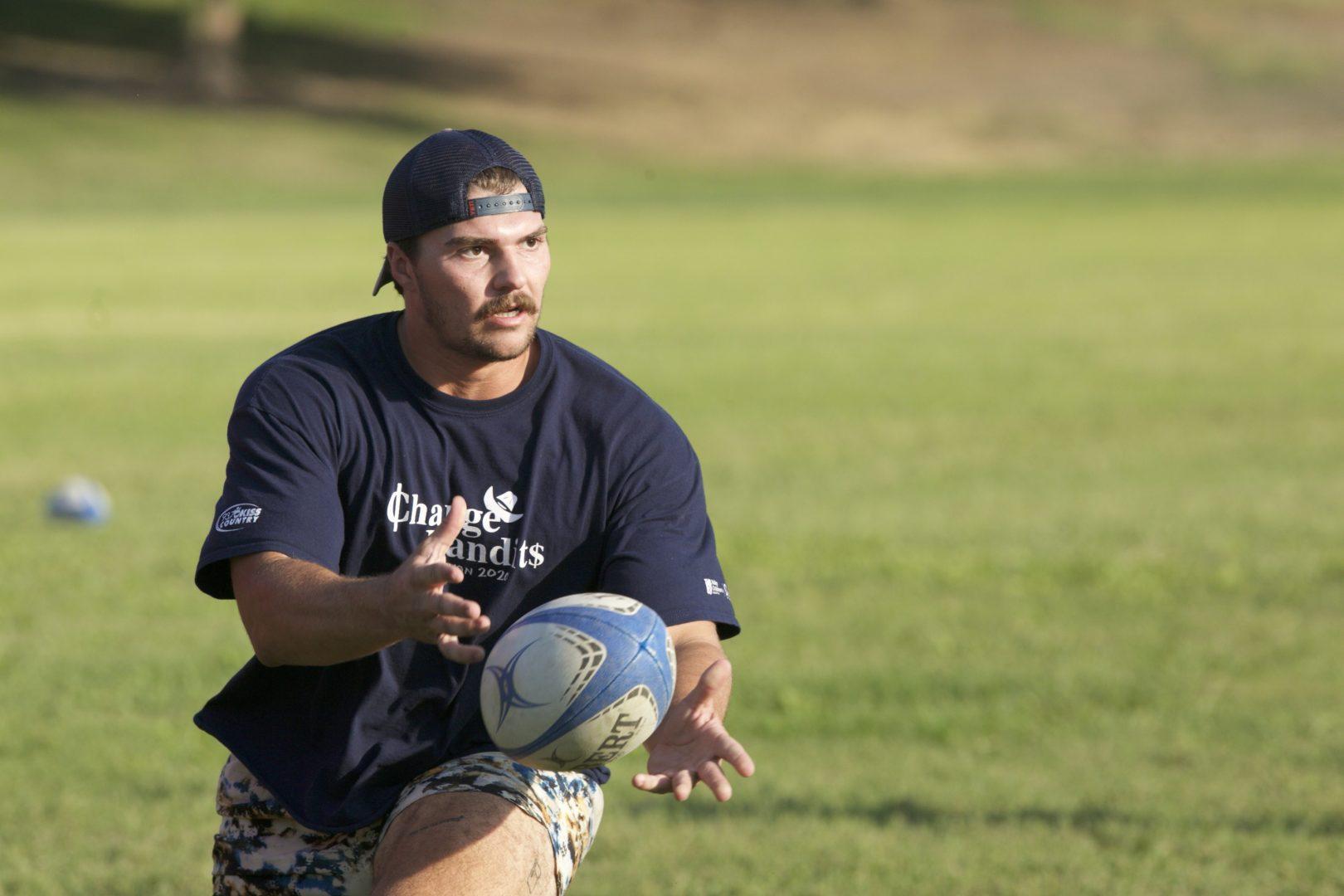At Rotary West Park, flies, mosquitos and red ants hover around people’s legs and infest whatever personal items are left on the ground.
It is not the worst-looking park in the world, but there are not many good qualities that can reject that argument. There’s a large hole that can injure any kid because rain or a leaky sprinkler flood the park.
This environment may not be suitable for anyone in the community; nevertheless, a nationally ranked men’s rugby team practices there.
“We have issues, a lot of times, in practice because you get a lot of cars broken into – where we train,” head coach Patrick Quan said. “Last season, the Fresno State Police Department was kindly coming by and going through the parking lot to double check because it became such an issue.”
They have to pay $75 each practice to use that field.
Since they are a club sport, it is out of their own pockets. The men’s rugby team are only allowed to practice in the kinesiology field twice a month, if they’re lucky. Subsequently, they make contracts with the City of Fresno to reserve fields wherever they can play, including the Rotary West Park.
But despite having a contract, the team often negotiates with people around the neighborhood who do not understand they have the area reserved. It is also not practical to train in different parks and fields.
Quan shared his frustration with constantly moving equipment and the difficulties of transportations because his players must go away from Fresno State.
“I feel sorry for the players,” Quan said. “You know, the effort that a kid puts in as an athlete is no different if you’re playing rugby or any other sport.”
The rugby team always explains to other people that they are a competitive sport that represents Fresno State. Being called a club sport has negative connotations because it is not supported by the athletic department.
Also, the popularity of rugby in America is far less than in other countries.
“Yeah, it’s not super popularized in the United States, but the community is pretty awesome. It’s like no other community,” said Josh Jacobson, in his fourth year on the team. “Some people don’t actually realize we’re a team that plays against other teams. People ask ‘you play against Stanford?’ Yeah, of course, we do.”
Fresno State is one of the youngest rugby teams in the league, starting in 2009. The team started as a division two team. But the U.S.A. Rugby organization adjusted their programs to rank rugby divisions based on other school’s programs like football and basketball, so the new team moved up to division one.
A couple of years after is when Quan joined the team in 2015.
He noticed the struggle the rugby team was having when they were a division two team, so he had a lot of ground to cover in order to build his team up.
The decision the coaching staff made was to get a young core of players that love the sport and make a winning team in a long, player-development process.
In his fifth year of coaching, the team’s season started great in a victory over No. 4 Chico State. The win got them serious traction because it was their first time beating a ranked opponent, and then, it was the first time they went undefeated into the playoffs.
Unfortunately, their best year got cut short because the pandemic canceled the rest of their season and paused all games for over a year and a half.
“It was tough because there was a lot of free time,” Isaia Kruse said, who’s been practicing with the team since his junior year of high school. “Some of us actually put in a lot more work over that break, and we came back better than ever.”
Many returning players are looking to repeat the success they had before the pandemic, but they struggle with school support because of their classification as a club sport. The only difference Quan sees between them and sports in the athletics department is the funding.
“These guys are truly Fresno State athletes in every single way,” Quan said. “You got to be a full-time student, in good standing, to play rugby in college… it’s not an open door. Not everybody can play. You have to meet all these criteria.”
The rugby team represents Fresno State, but the name seems to be the only thing they get from the school. They don’t get support like scholarships, access to the weight room and equipment.
Quan is grateful the school is giving them more stuff this year like some jerseys and, especially, the kinesiology field for games. Before, they had to play their games in a middle school field, and visiting teams would ask if the middle school was the Fresno State campus.
The rugby team believes their performance should be proof for more support.
Quan pointed out that this is a problem solely for Fresno State’s team, comparing them to Stanford’s rugby team.
Stanford has played rugby since 1891 and has a multi-million dollar rugby field. They have a lot of funding and high-paying coaching jobs – they’re also a club sport. In their last season, Fresno State defeated Stanford by 50 points.
Quan is not even considered a sports coach because it’s a club sport; he’s considered a volunteer with no payment.
“This is not a career. Coaching rugby could be, but coaching Fresno State is not,” Quan said. “For me, this is a labor love… my goal coming into Fresno State was to make them a nationally recognized program.”
When the rugby season was canceled in 2020, Fresno State was ranked No. 11 in the nation.
The team is not asking for a multi-million dollar field, but something better than a muddy park that closes whenever it rains.

“I think a program really needs to be established,” Joe Kryger, a Fresno State master’s student in his fourth year on the team, said. “Coming from a background of teams that had to fend for themselves is something normal to me. Just grinding and working for things is the norm for me.”
Kryger made the USA’s All-American camp and has practiced with veteran players from other countries like South Africa. Quan believes Kryger can make it to a professional league.
The team has a lot of promising players. Kruse played in the Pan-American rugby league and played for Team USA in the 2018 Summer Youth Olympics.
Kruse started playing for the Fresno State’s rugby team after graduating high school.
“My dad kind of made me play [rugby] when I was younger. I played all kinds of sports, but it was just the sport I liked the most,” Kruse said.
Kruse and the team invite others to try out. Although it is hard and underappreciated, the community and camaraderie are what make them stay. From teammates who are Olympians to those who never heard of the sport, they treat everyone like family.
“If you want to be part of an experience where you can make friends and play an athletic, aggressive sport, we’ll welcome you,” Jacobson said. “Even if you come out here and don’t like it, we still respect you for trying.”
Quan said that mindset is what puts this team above other ranked opponents across the nation, despite a lack of resources. The underdog feeling drives these Bulldog players.
“They have to do more with less. And I don’t know if it’s right or wrong, I mean that’s for other people to decide, but I think you’d find a similar story from the other club sports at [Fresno State]” Quan said. “The struggles that maybe a club sport has is not unique to the rugby team.”
Quan said it’s not fair for the students who put in the effort for their teams but receive no attention in return. His team must coordinate around school, work and any other obstacles life throws at them, like a pandemic.
Still, they remain diligent and enthusiastic to go out to a city park to train with their newfound brothers because they know they can play at a high level with little resources. They have done it before.
“These practices are hard, and we’ll work them hard… We’re out here training wherever we can. We’re playing games all over the place.” Quan said. “They’re a lot of sacrifices they make to play. I think that should be acknowledged.”





